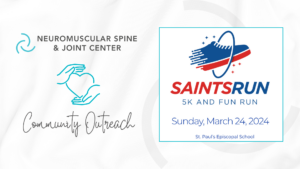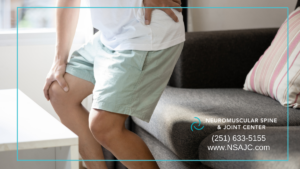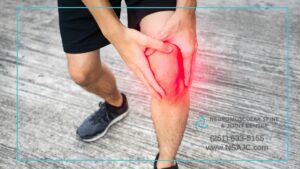Here are some examples of typical rehabilitation exercises for your condition. Start each exercise slowly. Ease off the exercise if you start to have pain.
Your doctor or physical therapist will tell you when you can start these exercises and which ones will work best for you.
How to do the exercises
Knee-to-chest stretch
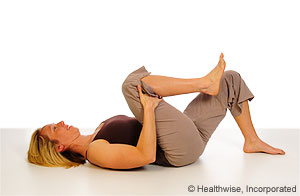
Do not do the knee-to-chest exercise if it causes or increases back or leg pain.
- Lie on your back with your knees bent and your feet flat on the floor. You can put a small pillow under your head and neck if it is more comfortable.
- Grasp your hands under one knee and bring the knee to your chest, keeping the other foot flat on the floor.
- Keep your lower back pressed to the floor. Hold for at least 15 to 30 seconds.
- Relax and lower the knee to the starting position. Repeat with the other leg.
- Repeat 2 to 4 times with each leg.
- To get more stretch, keep your other leg flat on the floor while pulling your knee to your chest.
Bridging
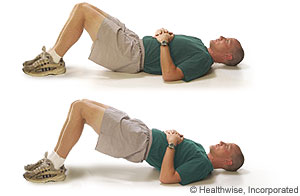
- Lie on your back with both knees bent. Your knees should be bent about 90 degrees.
- Tighten your belly muscles by pulling in your belly button toward your spine. Then push your feet into the floor, squeeze your buttocks, and lift your hips off the floor until your shoulders, hips, and knees are all in a straight line.
- Hold for about 6 seconds as you continue to breathe normally, and then slowly lower your hips back down to the floor and rest for up to 10 seconds.
- Repeat 8 to 12 times.
Hip extension
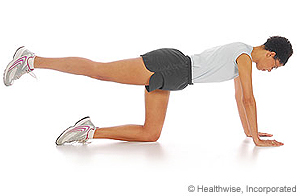
- Get down on your hands and knees on the floor.
- Keeping your back and neck straight, lift one leg straight out behind you. When you lift your leg, keep your hips level. Don’t let your back twist, and don’t let your hip drop toward the floor.
- Hold for 6 seconds. Repeat 8 to 12 times with each leg.
- If you feel steady and strong when you do this exercise, you can make it more difficult. To do this, when you lift your leg, also lift the opposite arm straight out in front of you. For example, lift the left leg and the right arm at the same time. (This is sometimes called the “bird dog exercise.”) Hold for 6 seconds, and repeat 8 to 12 times on each side.
Clamshell
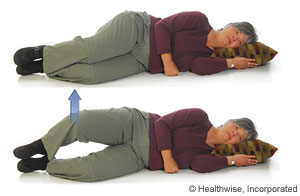
- Lie on your side with a pillow under your head. Keep your feet and knees together and your knees bent.
- Raise your top knee, but keep your feet together. Do not let your hips roll back. Your legs should open up like a clamshell.
- Hold for 6 seconds.
- Slowly lower your knee back down. Rest for 10 seconds.
- Repeat 8 to 12 times.
- Switch to your other side and repeat steps 1 through 5.
Hamstring wall stretch
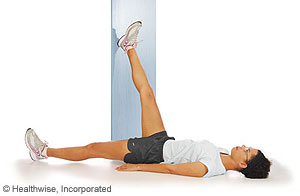
- Lie on your back in a doorway, with one leg through the open door.
- Slide your affected leg up the wall to straighten your knee. You should feel a gentle stretch down the back of your leg.
- Do not arch your back.
- Do not bend either knee.
- Keep one heel touching the floor and the other heel touching the wall. Do not point your toes.
- Hold the stretch for at least 1 minute to begin. Then try to lengthen the time you hold the stretch to as long as 6 minutes.
- Switch legs, and repeat steps 1 through 3.
- Repeat 2 to 4 times.
If you do not have a place to do this exercise in a doorway, there is another way to do it:
- Lie on your back, and bend one knee.
- Loop a towel under the ball and toes of that foot, and hold the ends of the towel in your hands.
- Straighten your knee, and slowly pull back on the towel. You should feel a gentle stretch down the back of your leg.
- Switch legs, and repeat steps 1 through 3.
- Repeat 2 to 4 times.
Lower abdominal strengthening
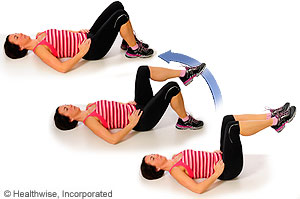
- Lie on your back with your knees bent and your feet flat on the floor.
- Tighten your belly muscles by pulling your belly button in toward your spine.
- Lift one foot off the floor and bring your knee toward your chest, so that your knee is straight above your hip and your leg is bent like the letter “L.”
- Lift the other knee up to the same position.
- Lower one leg at a time to the starting position.
- Keep alternating legs until you have lifted each leg 8 to 12 times.
- Be sure to keep your belly muscles tight and your back still as you are moving your legs. Be sure to breathe normally.
Piriformis stretch
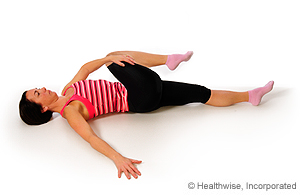
- Lie on your back with your legs straight.
- Lift your affected leg, and bend your knee. With your opposite hand, reach across your body, and then gently pull your knee toward your opposite shoulder.
- Hold the stretch for 15 to 30 seconds.
- Switch legs and repeat steps 1 through 3.
- Repeat 2 to 4 times.
Follow-up care is a key part of your treatment and safety. Be sure to make and go to all appointments, and call your doctor if you are having problems. It’s also a good idea to know your test results and keep a list of the medicines you take.
Care instructions adapted under license by Neuromuscular Spine & Joint Center. This care instruction is for use with your licensed healthcare professional. If you have questions about a medical condition or this instruction, always ask your healthcare professional. Kopp Medical LLC, DBA Neurmomuscular Spine & Joint Center disclaims any warranty or liability for your use of this information.
